新目标英语七年级下unit2课件
人教新目标英语七年级下册Unit2--3单词句型讲解词汇课件

词汇点睛
lot pron. 大量;许多
lots of = a lot of 大量的;许多的 +n
a lot (adv.) 修饰动词或句子 很;比较
【联想与总结】
many 许多的 +可数名词复数形式 much大量的 +不可数名词 some一些 +可数名词复数形式/不可数名词
Period 2
get up v. 起床
词汇点睛
【原文】What time do you usually get up?
【拓展】get 得到;拿;取;理解----getting(动名词) get up 起床 get to到达 get home到家 get on上车 get off 下车 get dressed穿衣
词汇点睛
brush v. 刷; n.刷子
tooth n.牙----teeth(pl.)
【例句】I brush my teeth after getting up. 【拓展】brush---brushes(动词三单形式;名词复数形式)
brush one’s teeth There are two brushes under the chair. Mary gets up at 7:00 and brushes her teeth at 7:15.
Period 1
o’clock n …点钟
词汇点睛
【例句】Most of students get up at seven o’clock these days.
【拓展】
时间---几点几分的表达用词及用法1
整点---(1)整时数(钟点数)+o’clock (单数)
七年级英语Go_for_it!_Unit_2_说课稿课件人教版新目标
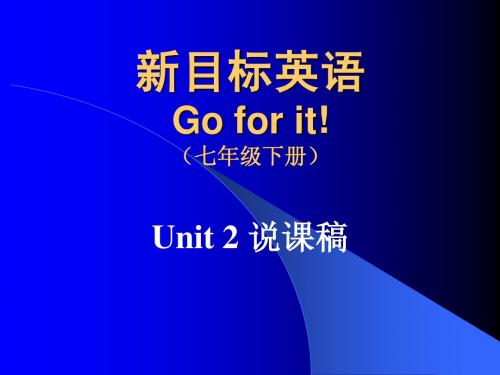
三、教学目标
1、语言知识 词汇: A、重点掌握表示建筑物种类的名词, 如post office, hotel, bank, supermarket, street, pay phone, avenue, B、掌握如下描绘性形容词及方位副词,如 clean, quiet, dirty, busy, right, left, down, along, C、方位介词,如next to, across from, in front of, near, between, behind D、短语,如 turn right, turn left, go down, go straight on, walk along, go along,
2、教材的地位及其作用 、 本单元的教学主要内容是:学习“问路指路”的 常用表达方式 ,该话题与学生的日常生活紧密 联系在一起,容易唤起学生的学习兴趣,这对 于提高学生的综合能力很有帮助,特别是说的 能力。通过本单元的学习描述某一建筑物的位 置,学会问路,指路,学会利用地图描述某一 社区。 本单元继续使用一般现在时,这是一个生活中离 不开的时态,也是最基本的一个时态。新课程 标准要求学生重点掌握一般现在时,这在英语 中使用频率很高,学好这一时态的用法对以后 其他时态的学习和交际有很大的帮助。
Students listen to teacher’s instruction and draw out the maps:
Map 1: Across from the bank is a supermarket. There is a post office between the library and the supermarket. Across from the supermarket is a park. Next to the park is a restaurant. Map 2: A library is next to the park. Across from the park is a bank. Next to the bank is a post office. Across from the post office is the restaurant, which is across from the supermarket.
七年级英语下 Unit 2 what time do you go to school全单元课件

Do you know how to ask the time?
• What time is it? • What is the time? • What time is it by your watch? • Can you read the time in English?
hour hand 时针
1a Match the activities with the picture.
1. get up
__c__
2. go to school __d__
3. get dressed __b__
4. brush teeth __f__
5. eat breakfast __e__
6. take a shower __a__
It has a big face. It has no eyes or ears. It has no legs, but it has three hands—two long hands and a short one. It has no mouth, but it can say “tick, tick, tick”.
时间的表示法:1.整点后用o’clock 2.点钟+分钟(用基数词表示)
4:00 four o’clock 11:15 eleven fifteen
12:00 twelve o’clock 3:50 three fifty
9:41 nine forty-one 2:20 two twenty
7:30 seven thirty 8:05 eight five
What time do you usually … in a school day?
eat breakfast
新目标人教版英语七年级下册单元主题写作课件(全册)
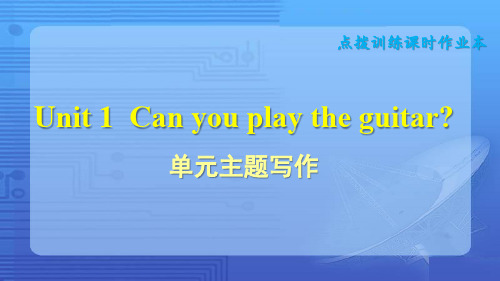
写作实践
假如你叫Tony,你希望加入你们学校的音乐俱乐 部。请根据提示,写一封电子邮件,表达你想要加入 该俱乐部的想法。
提示:1. 个人信息简介; 2. 在音乐方面的才能、特长; 3. 联系方式。
写作实践
要求:60词左右。开头及结尾已给出,不计入总 词数。
Dear Mr. Brown, I’m writing this email to you because
实战演练
Dear Rick, How are you? Now let me tell you about my day. __I___
_us_u_a_l_ly__g_e_t _u_p_a_t_6_:__0_0__i_n_t_h_e_m__o_rn_i_n_g_._T_h_e_n__a_t _6_:__1_5_I__ru_n_ _fo_r__h_a_lf__an__h_o_u_r_._I__b_ru_s_h__m_y__t_e_e_th__a_n_d__ta_k_e__a_s_h_o_w__e_r _a_t_a_ _qu_a_r_t_er__t_o_s_e_v_e_n_._T__h_en__I__h_a_v_e_b_r_e_a_k_fa_s_t__at__7_:__0_0__a_. _m_.__a_t _ho_m__e_._A_t_t_w_e_n_t_y_p_a_s_t_s_e_v_e_n_, _I _w_a_l_k_t_o_s_c_h_o_o_l._I__h_av_e__lu_n_c_h__a_t _te_n_t_o_t_w_e_l_v_e_a_t_s_c_h_o_o_l.__I__u_su_a_l_ly__g_o_h_o_m__e_a_t_5_:__3_0__p_. _m_.___
how I get to school. Now, let me tell you. ___________________________________________________ ___________________________________________________
人教新目标版初中英语七年级下册 Culture Unit 2 Festivals PPT课件

month as Senior citizen’s 7. Valentine’s Day G. the time of ghosts,
spirits, Gravestones
8.Double Ninth Day H. eating Zongzi to honor
1. Ramadan
A. celebrated on the 15th day
of the first Chinese lunar month
2. Lantern Festival B. chocolate, bunnies,
coloured eggs for its symbols
3.Mardi Gras
The official colors for Mardi Gras are purple, green, and gold. These colors where chosen in 1872 by the King of Carnival, Rex.
Ramadan
Ramadan is the ninth month in the Muslim calendar and, according to Islamic belief, the month during which Allah (God) delivered the Koran to the prophet Mohammed. During Ramadan, Muslims (followers of Islam) do not eat or drink during the day. This is called fasting.
Father’s Day On the third Sunday of June
新目标(人教)七年级下册英语教学课件 Unit 12 Section A(2a-2d)

/ˈbʌtə(r)flaɪ/ n. 蝴蝶
Lisa: Yeah, it was fun. They have a butterfly house with over 200
visitor /ˈvɪzɪtə(r)/ n. 游客;参观者
kinds of butterflies! I told the visitors about them and their
A: Hi, Mike. What did you do last weekend? B: I watched TV, and then I went fishing
with my father. A: How was your last weekend? B: It was boring.
Names
【用法详解】 sheep是可数名词,意为“羊;绵羊”,其复数形式仍然是sheep。 ➢Sheep are eating grass in the fields. 羊在田野里吃草。
单复数同形的可数名词: 中日鱼羊鹿,是单也是复。
(注:中 — Chinese 日—Japanese 鱼—fish 羊—sheep 鹿—deer)
Listen again and fill in the chart.
Who Becky Carol Jack
Weekend activities visited her grandma, did her homework stayed at home, studied for the English test
Read the sentences in 2a and say the original forms of verbs.
1. ___ I visited my (aunt/ grandma). visit 2. ___ I did (my homework/ sports). do 3. ___ I studied for the (English/ math) test. study 4. ___ I went to a (farm/ beach). go 5. ___ I fed some (sheep/cows). feed
英语人教新目标七年级下册Unit2Section B (2a – 2c)

Advice(建议):
get up early/on time have breakfast slowly eat fruit and vegetables
Mary eat ice-cream after dinner
Don’t eat ice-cream after dinner
精致卓越 大气开放 品质绵外 担当未来
(4)eats hamburgers for lunch
(5)plays basketballfor half an hour
does homework
(6)
first
(7)either watches o games
(8)at 10:30 _b_ru_s_h_e_s_t_e_et_h_ (9)then__g_o_e_s_t_o_b_e_d______
Teaching aims
Preparation
1.Master key words and Text book Page 11
phrases.
Notebook
2.Talk about healthy and Pen
unhealthy habits.
3. Improve reading skills.
Retell
Tony's Daily Routine
at 8:00
goes _t_o___s__c_h__o__o__l_____
at noon
plays basketball for half an___h__o_u__r______
in the brushes teeth and goesevening to bed________________
After school
新目标(人教)七年级下册英语单元复习课件 Unit 2复习课件

具体时刻,也可询问日期、月份、年份等。 ②when常用来提问年、月、日、上/下午等大概时间,此时
when不可与what time替换。
From twelve o'clock at night to six o'clock in the morning.从夜里十二点到早上六点。
on weekends
radio show
16.几点 ____w_h__a_t_t_i_m__e_______
1178..一半份小有时趣__的__工___作____a__n____i__n__t__e__r__e___s__ti_n_g__j_o_b__ 19.要么……要h么al…f …an;h或ou者r……或者…… ____________________ 20.做作业 _________________________
either...or...
do (one’s) homework
21.去睡觉 __g_o__t_o__b__e_d_________ 2223..到散家 步;__走g__e一_t__走h_o__m_____e_________________________ 24.快速地吃 _________ta__k_e__a__w_a__lk_ 25.做运动 ____________________
play computer games
go home
三、核心句型
1. 里克,你通常几点钟洗淋浴?
__W__h_a_t_ _t_im__e___ do you usually _t_a_k_e__ __a_ _s_h_o_w__e_r,Rick? 2. 我通常在六点半起床。 I _______ ____ _____ at six thirty. 3.u—su—a斯lly科g特et,u你p的广播节目在几点?——从夜里12点到早上6点。 —Scott,________ ________ is your radio show? —_______ wtwhealvte o'cltoimckeat night _______ six o'clock in the morning.
七年级英语下册 Unit 2 Where is the post office课件 人教新目标

pay phone
1
2
3
4
56Leabharlann 78• Is there a post office near here? • Yes, there is. There’s one on Bridge Street.
•1、纪律是集体的面貌,集体的声音,集体的动作,集体的表情,集体的信念。 •2、知之者不如好之者,好之者不如乐之者。 •3、反思自我时展示了勇气,自我反思是一切思想的源泉。 •4、在教师手里操着幼年人的命运,便操着民族和人类的命运。一年之计,莫如树谷;十年之计,莫如树木;终身之计,莫如树人。 •5、诚实比一切智谋更好,而且它是智谋的基本条件。 •6、做老师的只要有一次向学生撒谎撒漏了底,就可能使他的全部教育成果从此为之失败。2022年1月2022/1/192022/1/192022/1/191/19/2022 •7、凡为教者必期于达到不须教。对人以诚信,人不欺我;对事以诚信,事无不成。2022/1/192022/1/19January 19, 2022 •8、教育者,非为已往,非为现在,而专为将来。2022/1/192022/1/192022/1/192022/1/19
Yes, there is.
Is there a bridge near our school?
在…附近
No, there isn’t.
bridge
park
There are many trees(树) and flowers(花) in it.
You can play there.
Is there a pay phone near our school? Yes, there is.
新目标(人教)七年级下册英语教学课件 Unit 2 Section B(1a-1e)

(在)周末
Student 1 Student 2
Student 3
Name: ____ Name: ____ Name: ____
get up on weekends exercise eat dinner take a shower go to school
Finish the table in 3c and give your report like this.
usually; never. ➢ Key sentences:
1. What time do you get up on school days? 2. Anna never eats breakfast. 3.When do your friends exercise ? ➢To learn to use adverbs of frequency and ask about times.
What time does Rick eat breakfast?
He eats breakfast at seven o’clock.
When does Scott go to work?
He always goes to work at eleven o’clock. He’s never late.
When do your friends exercise? They usually exercise on weekends.
Question 1:when 和 what time 区别
what time和when都是就时间 提问,它们的回答有何异同?
what time问题的回答仅仅为时刻, 而针对when问题的回答还可以是 更加笼统的时间,如: on weekends, in the morning等。
新目标(人教)七年级下册英语教学课件 Unit 2 Section B(2a-2c)

breakfast, so I usually eat very quickly. For lunch, I usually eat
半小时
hamburgers. After school, I sometimes play basketball for half an hour.
to bed early; eat quickly; play sports; unhealthy; think of.
➢Key sentences:
1. I don't have much time for breakfast, so I usually eat very quickly.
2. After school, I sometimes play basketball for half an hour.
2b
Tony and Mary are brother and sister. They have healthy and unhealthy habits. Who is healthier?
Circle the healthy activities.
Hi! I’m Tony. I don’t like to get up early. In the morning, I get up at eight. Then I go to school at eight thirty. I don’t have much time for breakfast, so I usually eat very quickly. For lunch, I usually eat hamburgers. After school, I sometimes play basketball for half an hour. When I get home, I always do my homework first. In the evening, I either watch TV or play computer games. At ten thirty, I brush my teeth and then I go to bed.
Unit2SectionA正确用英文读时间时间的表达方法课件人教版英语七年级下册
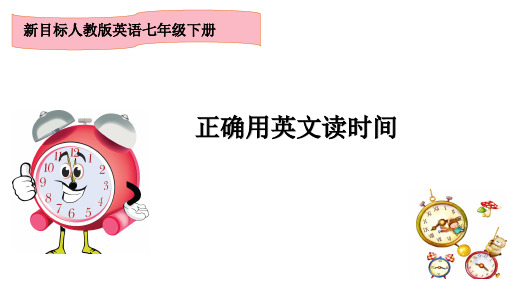
exercise
two fifteen a quarter past two
eleven forty twenty to twelve
two thirty half past two
one o’clock
Thank you!
ten to nine
-What time is it? -It's ten to nine.
二、逆读法
exercise
分钟数大于30,从右到左读,(60-分)+to+(小时+1)。
7:50
ten to eight
3:55
five to four
1:45 fifteen to two
exercise
新目标人教版英语七年级下册
正确用英文读时间
Guess what it is
-What time is it? -It's ....
一、直读法
小时和分钟分开,从左到右分别用英文读出 对应数字。
8:10
eight ten
-What time is it? -It's eight ten.
一、直读法
summary
一、直读法
小时和分钟分开,从左到右分别用英文读出对应数字。
二、逆读法
分钟数小于或等于30,从右到左读,分+past+小时。 分钟数大于30,从右到左读,(60-分)+to+(小时+1)。
homework
请用直读法和逆读法两种方法,读出 现在的时间。
时间的表达方法
Observing and summarizing
2013学年七年级下册 Unit 2 What time do you go to school(Section A 1a-2c)课件 人教新目标版
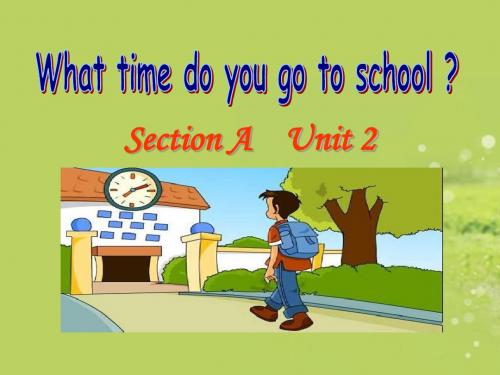
Proverbs: Time is money. 一寸光阴,一寸金。 Time is life. 时间就是生命。 Time flies. 时光如梭 Time and tide wait for no man. 时不我待!
What time is it? It’s …
对划线部分提问:
He eats breakfast at seven o’clock. What time does he eat breakfast?
She plays sports at eight o’clock.
What time does she play sports?
He eats breakfast at seven o’clock.
1.I get up at six thirty. (提问) What time do you get up? 2.She eats breakfast at a quarter past seven. What time does she eat breakfast? 3.Jerry goes to school at seven fifteen. What time does Jerry go to schol? 4.Mary takes a shower at 8:00. (一般疑问句) Does Mary take a shower at 8:00? 5.My father goes to work at half past eight.(同上)
2. always 意为“总是,一直”
usually 意为“通常地,” never 意为“从未,绝不”
频率词
(用在实义动词前, 助动词/be动词后.)
often 意为“ 经常 ”
新目标英语七年级下册unit2整单元课件

big
small
Look at the picture. There’s a school in the picture. in / on School Street. The book store is______ It’s________ behind the next _______ to school. The bank is ______ the school. The pay between the school and the hospital. phone is_______ across from Can you see the post office? It’s_____ ______the school. in front of There is a supermarket. It’s_____ ____ ____ the park.
1b Match the words with the places in the pictures. 1. post office __ f 2. library __ a 3. hotel __ e 4. restaurant __ i
5. bank __ c
6. supermarket __ b 7. street __ h 9. park __ d
Unit 2
Where’s the post office?
Section A
post office
library
hotel
restaurant
bank
supermarketpa来自 phoneparkhospital
airport
-Where is the soccer ball? -It’s … the box.
Unit2SectionB(2a2c)课件初中英语人教版新目标七年级下册(1)

2.阅读2b短文,找出Tony和Mary的日常活动时间并完成表
格。
Time __A__t_e__ig__h_t___ A_t_e_i_g_h__t_t_h__ir_t_y
At noon After school
Tony
Activities
Get up
Go to school
Ea_t__h_a_m__b__u_r_g_e__rs
3.能理解短文,并能描述自己或他人的日常生活作息习惯。
预习导学
同学们,你们认识加菲猫吗?下面让我们来看一看加菲猫在 日常生活中是什么样的。你认为它的生活方式健康吗?
一、选一选 完成教材上2a的练习,勾选出你认为健康的活动。
二、写一写 写出自己每天的生活习惯。 略。
三、填一填
请写出你健康和不健康的习惯。
3.你有哪些健康的和不健康的生活习惯,请写下来和同伴分 享。
·知识拓展· 常 见 的 食 物 类 名 词 , 除 课 本 上 出 现 的 外 , 还 有 salad “ 沙 拉”、tofu“豆腐”;mutton“羊肉”;sandwich“三明治”等。
阅读训练 ◎学法指导:阅读短文时,重点关注与生活习惯有关的短 语。有疑问时与同伴探讨或向老师求助。
Mary
Activities Get up
Go to school
Eat lots of fruit and vegetables P_l_a_y__v_o_l_le__y_b_a_l_l E_a_t__ic_e__-_c_r_e_a_m__
Do homew_o_r_k_,_s_w__i_m__o__r_take a walk Go to bed
Either you or I am right. 要么你对,要么我对。
Unit2SectionAGrammarFocus3c课件人教版七年级英语下册
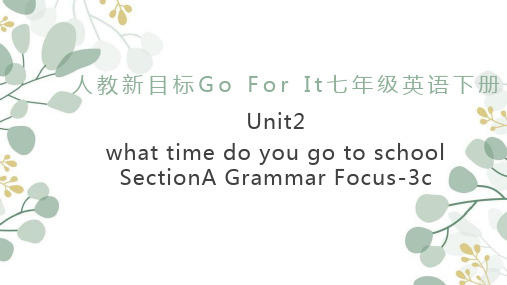
Activities
Name1: ______
Name2: ______
Name3: _____
get up on weekends exercise
eat dinner
take a shower go to school
Words
Sentences
I我al总wa是y6s:h30a吃ve早b餐re。akfast at six thirty. always
Summary
• A:What time do you usually get up? thirty.
B: I usually get up at six
• A: What time does Rick eat breakfast? o’clock.
B: He eats breakfast at seven
人教新目标Go For It七年级英语下册
Unit2 what time do you go to school
SectionA Grammar Focus-3c
Proverbs:
Time is money. 一寸光阴,一寸金。 Time is life. 时间就是生命。 Time flies. 时光如梭 Time and tide wait for no man. 时不我待!
辨相析 同w点h:at 二tim者e 都和表wh示en“___什__么__时__候_______” 不同点:what time用来询问____具__体__的__时__间__点_____
when既可以用来询问____具__体__的__时__间__点_,还可用来询问__时__间__段_____。 具体用法: 1.对时间状语提问时,有时两者可以互换。
七年级英语下册Unit2课时2SectionAGrammarFocus_3c课件pptx人教新目标版
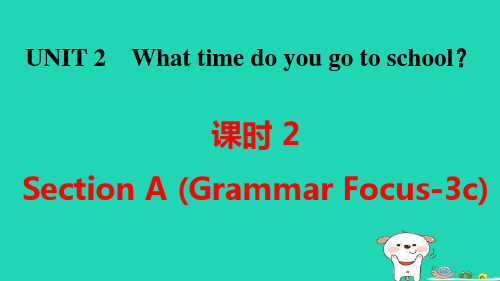
一
二
三
四
3. Who is your best (good) friend in your class? 4. When does the boy get (get) dressed? 5. Ann never plays (play) computer games at school.
一
二
三
四
exercise, work, she, shower, get,never, early, class, music, always
21. Her
students love her. They say she is
22. always kind and teaches them very well. Miss Zhang has
school.
A. never; for
B. never; to
C. always; for
D. always; to
一
二
三
四
( D )13. He
the first class at 8:00 in the morning.
A. usually have
B. have usually
C. has usually
一
二
三
四
exercise, work, she, shower, get,never, early, class, music, always
Miss Zhang is busy every day. She is an English teacher. She
16. works very long hours every day. She gets up 17. early in the morning. She 18. exercises at 6:15.
人教版(新目标)初中英语七年级下册Unit 2
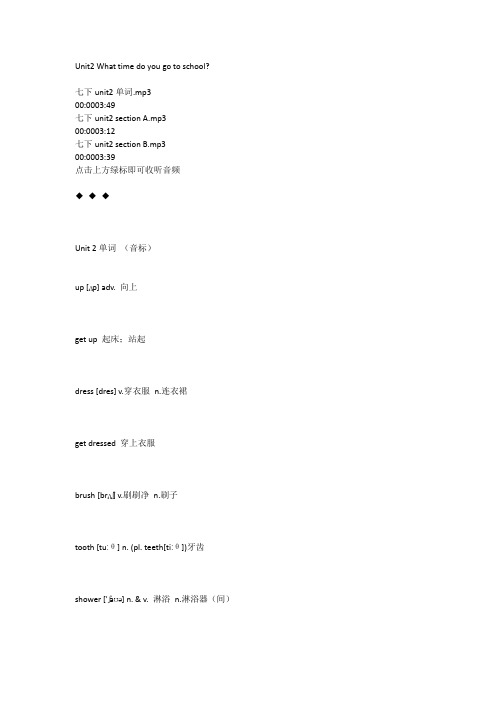
Unit2 What time do you go to school?七下unit2单词.mp300:0003:49七下unit2 section A.mp300:0003:12七下unit2 section B.mp300:0003:39点击上方绿标即可收听音频◆◆◆Unit 2单词(音标)up [ʌp] adv. 向上get up 起床;站起dress [dres] v.穿衣服n.连衣裙get dressed 穿上衣服brush [brʌʃ] v.刷刷净n.刷子tooth [tuːθ] n. (pl. teeth[tiːθ])牙齿shower ['ʃaʊə] n. & v. 淋浴n.淋浴器(间)take a shower 洗淋浴usually ['ju:ʒuəli] adv.通常地;一般地forty ['fɔ:(r)ti] num.四十wow [waʊ] interj.(表示惊奇或敬佩)哇;呀never ['nevə(r)] adv.从不;绝不early ['ɜːlɪ] adv. & adj.早(的)fifty ['fɪftɪ] num.五十job [dʒɒb], [dʒɑːb] n.工作;职业work [wɜːk] v. & n. 工作station ['steɪʃn] n.电(视)台;车站radio station 广播电台o'clock [ə'klɒk], [ə'klɑ:k] adv.(表示整点)……点钟night [naɪt] n. 晚上;夜晚funny ['fʌnɪ] adj.奇怪的;滑稽好笑的exercise ['eksəsaɪz] v. & n. 锻炼;练习on weekends (在)周末best [best] adj.最好的adv.最好地;最group [gruːp] n.组;群half [hɑːf], [hæf] n. & pron. 一半;半数past [pɑːst],[pæst] prep.晚于;过(时间)adj.过去的quarter ['kwɔː(r)tə(r)] n.一刻钟;四分之一homework['həʊmwɜː(r)k] n. 家庭作业do (one’s) homework 做作业run [rʌn] v. 跑;奔clean [kliːn] v.打扫;弄干净adj.干净的walk [wɔːk] n. & v. 行走;步行take a walk 散步;走一走quickly ['kwɪkli] adv. 很快地either ['aɪðə(r)], [ 'iːðə(r) ]adv.或者;也(用在否定词组后)either…or…要么……要么……;或者……或者……lot [lɒt], [lɑ:t] pron.大量;许多lots of 大量;许多sometimes ['sʌmtaɪmz] adv.有时taste [teɪst] v.有……的味道;品尝n.味道;滋味life [laɪf] n.生活;生命Rick [rɪk] 里克(男名)Jim [dʒɪm] 吉姆(男名)Scott [skɒt], [skɑ:t] 斯科特(男名)Tony ['təʊnɪ] 托尼(男名)unit2电子课本Unit2 知识梳理◆短语归纳1. what time 几点2. go to school 去上学3. get up 起床4. take a shower 洗淋浴5. brush teeth 刷牙6. get to 到达7. do homework 做家庭作业8. go to work 去上班9. go home 回家10. eat breakfast 吃早饭11. get dressed 穿上衣服12. get home 到家13. either…or…要么…要么…14. go to bed 上床睡觉15. in the morning/afternoon/evening 在上午/下午/晚上16. take a walk 散步17. lots of=a lot of 许多,大量18. radio station 广播电台19. at night 在晚上20. be late for=arrive late for 迟到◆用法集萃1. at + 具体时间点在几点(几分)2. eat breakfast/lunch/dinner 吃早饭/午饭/晚饭3. thirty/half past +基数词…点半4. fifteen/a quarter to +基数词差一刻到…点5. take a/an+名词从事…活动6. from…to…从…到…7. need to do sth 需要做某事◆典句必背1. —What time do you usually get up? 你通常几点钟起床?—I usually get up at six thirty. 我通常6:30起床。
- 1、下载文档前请自行甄别文档内容的完整性,平台不提供额外的编辑、内容补充、找答案等附加服务。
- 2、"仅部分预览"的文档,不可在线预览部分如存在完整性等问题,可反馈申请退款(可完整预览的文档不适用该条件!)。
- 3、如文档侵犯您的权益,请联系客服反馈,我们会尽快为您处理(人工客服工作时间:9:00-18:30)。
Is there a bank
near here?
Yes, there’s a bank
on Center Street.
There be 句型
1 表示某处存在某物。 2 单数名词用is, There is
3 复数名词要用are,There are
4 如果一个句子中名词既有 单数又有复数,be动词依据
新目标英语七年级下unit2 件
post office
library
restaurant
bank
supermarket
street
pay phone
park
avenue
bridge
garden
airport
garden
park
restaurant
library
post office
bridge
3. 某地有某物吗?
Is there + a/an + n. + in the …?
Are there + (any) + n.-s + in the …?
1有
2 某物 3 在某地吗
(介词短语)
1. 在图书馆旁边有一个投币电话吗?
Is there a pay phone next to the library? 2. 在第五条大街上有一家超市吗?
-Where is the soccer ball? -It’s __n_e_x_t _to__ the box.
-Where is the soccer ball? -It’s i_n_f_r_o_n_t_o_f_ the box.
Is there a supermarket on Fifth Avenue? 3. 在你家附近有宾馆吗?
Is there a hotel near your home? 4. 在宾馆对面有银行吗?
Is there a bank across from the hotel? 5. 在邮局后边有饭馆吗?
有
某物 在某地
(介词短语)
1. 在桌子下有一本书。 There is a book under the table (desk).
2. 在书橱里有一些书。 There are some books in the bookcase.
3. 在地上有一支铅笔和三个球。 There is a pen and three balls on the floor
2. Is there a post office near here? Yes, there is. There’s one on Bridge Street.
3. Is there a supermarket on Center Street? No, there isn’t.
• Is there a post office near here? • Yes, there is. There’s one on Bridge Street.
“就近原则”,由靠近There
be 的名词决定。
1.某地有某物。
There is + a/an + n. + 某地
e.g. There is a basketball on the floor.
There are + (some) + n.-s + 某地
e.g. There are some apples on the table.
Is there a restaurant behind the post office? 6. 在你家有兄弟姐妹?吗?
Are there any brothers and sisters in your family?
1b
1. Is there a restaurant on Fifth Avenue? Yes, there ere isn’t a restaurant across from the supermarket.
5. 在第六条大街上没有银行.
There isn’t a bank on the Sixth Avenue.
6. 在我们学校没有外国学生.
There aren’t any foreign students in our school.
-Where is the soccer ball? -It’s … the box.
on the box
in the box under the box
-Where is the soccer ball? -It’s __b_e_h_in_d__ the box.
-Where is the soccer ball? -It’s _n_e_a_r_ the box.
bank
avenue
airport
street
pay phone
supermarket
1a
post office __f__ library __a___ hotel __e___ restaurant ___i __ bank __c___ supermarket __b__ street __h___ pay phone ___g__ park ___d___
4. 在椅子附近有一些篮球。 There are some basketballs near the chair.
5. 我们班上有55个学生。 There are fifty-five students in our class.
6. 我的背包里面有一些新书。
There are some new books in my backback.
2. 某地没有某物。 There isn’t + a/an + n. + 某地
e.g. There isn’t a book on the bookcase.
There aren’t + (any) + n.-s + 某地
e.g. There aren’t any students in our class.
没有 某物
在某地
(介词短语)
1. 在梳妆台上没有手表.
There isn’t a watch on the dresser.
2. 在抽屉里没有(一些)字典.
There aren’t any dictionaries in the drawer.
3. 在我们城市没有邮局.
There isn’t a post office in our city.
